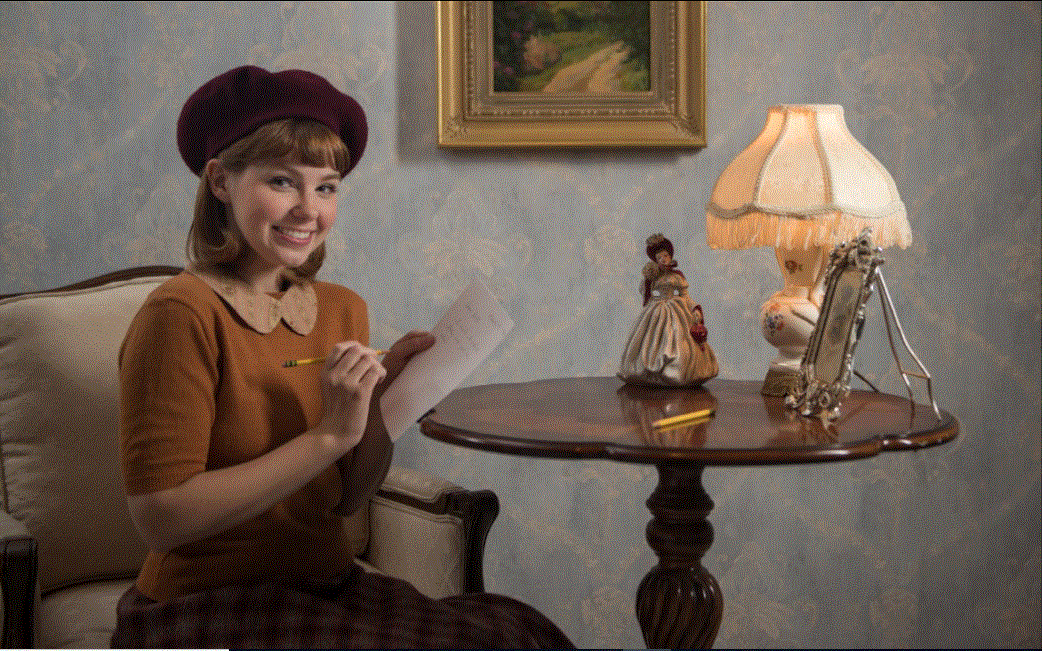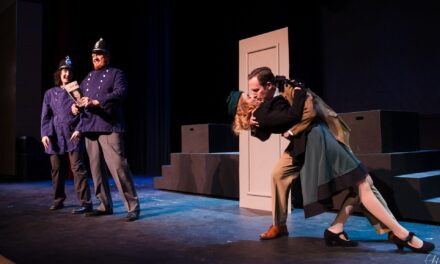OREM — Hale Center Theater Orem made a great choice to start the new year with the comedy Dear Ruth. Written by Norman Krasna and premiered on Broadway in 1944, Dear Ruth is a perfectly crafted comedy, with delightful mystery and the most intense love triangle. The play also explores the great lengths some teenagers will go when they are overly confident and helpful.

Show closes February 3, 2018.
At the beginning, the play introduces Judge Harry and Edith Wilkins and their daughters, Ruth and Miriam, and their fun family banter sets the stage for laughs throughout the show. After the girls have gone, an eager Lieutenant William Seawright shows up while on a two-day leave to meet his girl, Ruth, in person, after their long exchange of love letters. However, Ruth also is engaged to her friend Albert Kummer from her carpool. The comedy of Dear Ruth originates in straightening out the love triangle (which later becomes a love rectangle), which—delightfully—takes the entire evening to unfold.
Barta Lee Heiner directed this wonderful comedy, and her style is masterful. She made some great comedic timing happen, adding hilarious movements and actions in between transitions which made for lots of laughter that didn’t halt the flow of the show. To see a comedy that can get me laughing every five seconds is a rare treat, and this one was very good at that. I also think Heiner organized her cast to use the space well. It was rare when I couldn’t see what was happening or couldn’t hear the dialogue, even though the play was staged in the round.

Left to right: Marissa Scout Lanham, Becca Ingram as Miriam Wilkins, and Josh Valdez as Lt. William Seawright. Photo by Suzy Oliveria.
However, I wish the transition near the end with Ruth deciding she wanted to be with Seawright was more pronounced. I also wish there had been a bit more connection with what Ruth actually liked, instead of the Lieutenant reaching out the whole time with flowers and treats that were Miriam’s favorite things. Additionally, the ending was overly rushed and there was too much laughter to hear the last line, which could easily be adjusted by changing the timing slightly. Aside from the ending, I really loved the artistic feel of how the cast performed the script, and each performer seemed to have a nostalgic energy that fit in with the movies of World War II time period.
Because of the 1940’s setting of the play, I kept expecting it to be black and white, but the costumes and set were lovely. I liked the mostly white choice of furniture which helped the colorful costumes to stand out, and which looked ravishing decked out in lilacs. The costumes were bright and tasteful, and I especially admired Miriam’s modern overalls with the bell bottoms. It looked like Kris Hansen-Call, the costume designer, had a lot of fun with this show.
Marissa Scout Lanham, in the role of Miriam Wilkins, was possibly the best actress of the show, though many other cast members came close. But Lanham’s performance was so rich with adolescent character and great comedic timing that I just have to single her out. When Miriam’s parents are bugging Ruth to tell them about her man, Lanham shows up on the stairs and in stunned awe says, “Bill?” That one word and the way she said it still makes me laugh while I write this. Lanham had a know-it-all attitude about so many things and portrayed the perfect liberal of her time period. Miriam’s true emotions would shine through the silliness of her character, and I could see an intense teenage crush on Seabright. Sometimes Lanham intensified her lines to that of a soap opera, which was not only thoroughly entertaining, but a very effective tool to help Miriam escape the house. It was a joy to see her performance.
Geoff Means played Albert Kummer, and I’ve enjoyed his performing before in a similar role in Pillow Talk. Means was just as amazing as ever, with his face, eyes, hands, and body doing so many things at once that I am sure I could see this show again and laugh at mannerisms I hadn’t noticed the last time. Means is creative in his reactions, for example, as he sees the Lieutenant coming to greet Ruth, he lunges at the last moment to “check” on the blueprints on the table while keeping his feet at the base of the couch, thus effectively blocking the exchange. And there is one scene when Albert is very upset, and as he talks he gets so distressed that his head actually looks larger and slips down like a fat turtle trying to get inside it’s shell unsuccessfully. Means then checked his pulse, looked at his watch and says, “I’m not supposed to get too excited.” This is repeated throughout the scene, and every time he did this, it looked so hilarious.
Mark Pulham and Diana Graham played the parents, Judge Harry Wilkins, and Edith Wilkins, and the two made a great couple. Pulham was smaller than Graham, which made for a fun contrast. Pulham said some of his best lines in such a way that it was clear that Harry was funny, nobody really listens. These lines were quieter, though I could hear them clearly. Graham’s motherliness came through despite the perfect aura she put out.
Lieutenant William Seawright was played by Josh Valdez. At first Valdez disappointed me with his monotone speaking voice, but I warmed up to his performance as he portrayed more emotion and allowed his character to shine. He had a great energy, and when he reached the point of shame, it was honest, raw emotion. I could really feel for William in that moment.
Dear Ruth was written so well that the play can stand the test of time. I especially loved how Krasna wrote Miriam, who at one time called her father, “A prominent member of the last generation has just walked in.” She had a lot of lines about the younger generation against the older, which was very interesting considering today’s millennials vs. baby boomers dynamic. Krasna wrote this show in a way that the laughter fit right in with the seriousness of the situation and the deeper emotions were present. I liked that because it felt more real than many comedies I’ve seen, and was a lot easier to relate to. Sometimes I feel like that dad when he says he’s just going to go along for the ride since it can’t get any worse.
So many things about Dear Ruth were perfect. I am partial to the old black and white movies of this time period, so for me the play was not just a comedy, but a connection to the past. A lot of great artists have put their professional touch into this show at the Orem Hale, and it’s sure to be a great experience for anyone, young and old.
Donate to Utah Theatre Bloggers Association today and help support theatre criticism in Utah. Our staff work hard to be an independent voice in our arts community. Currently, our goal is to pay our reviewers and editors. UTBA is a non-profit organization, and your donation is fully tax deductible.





